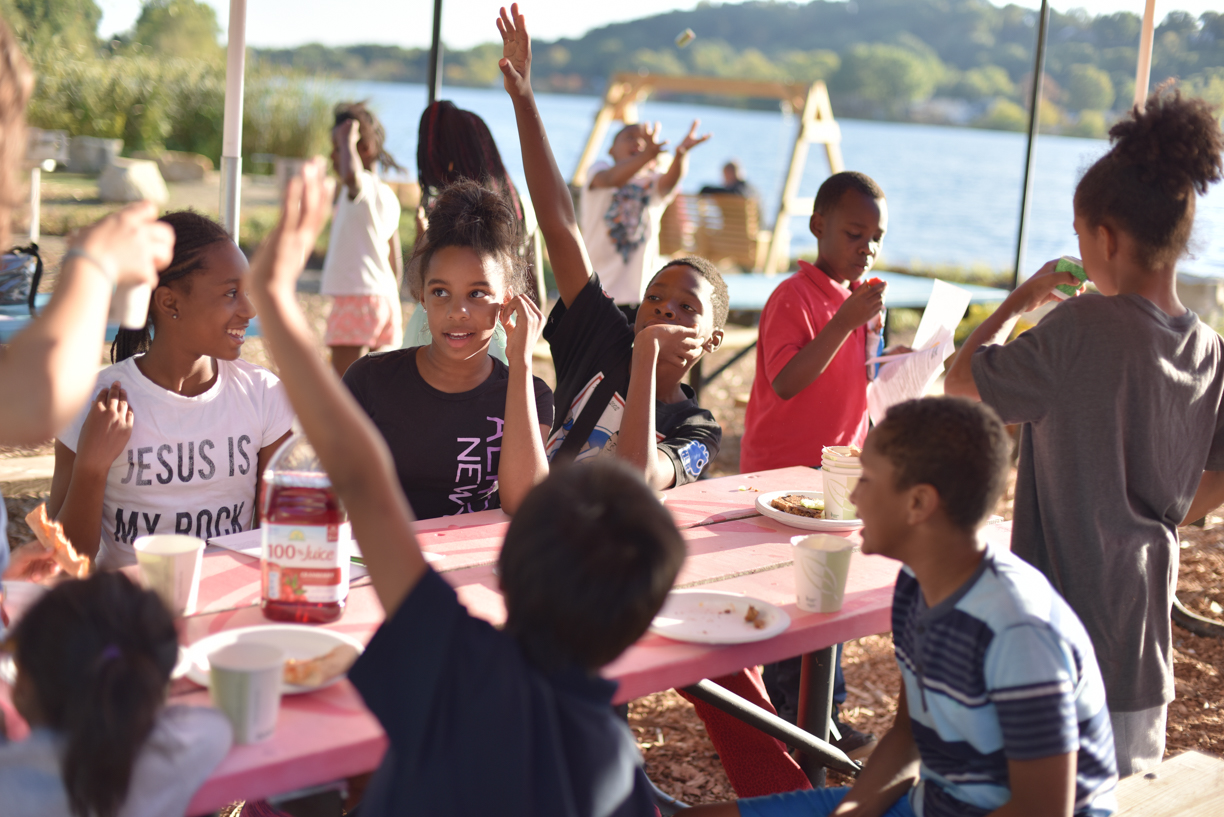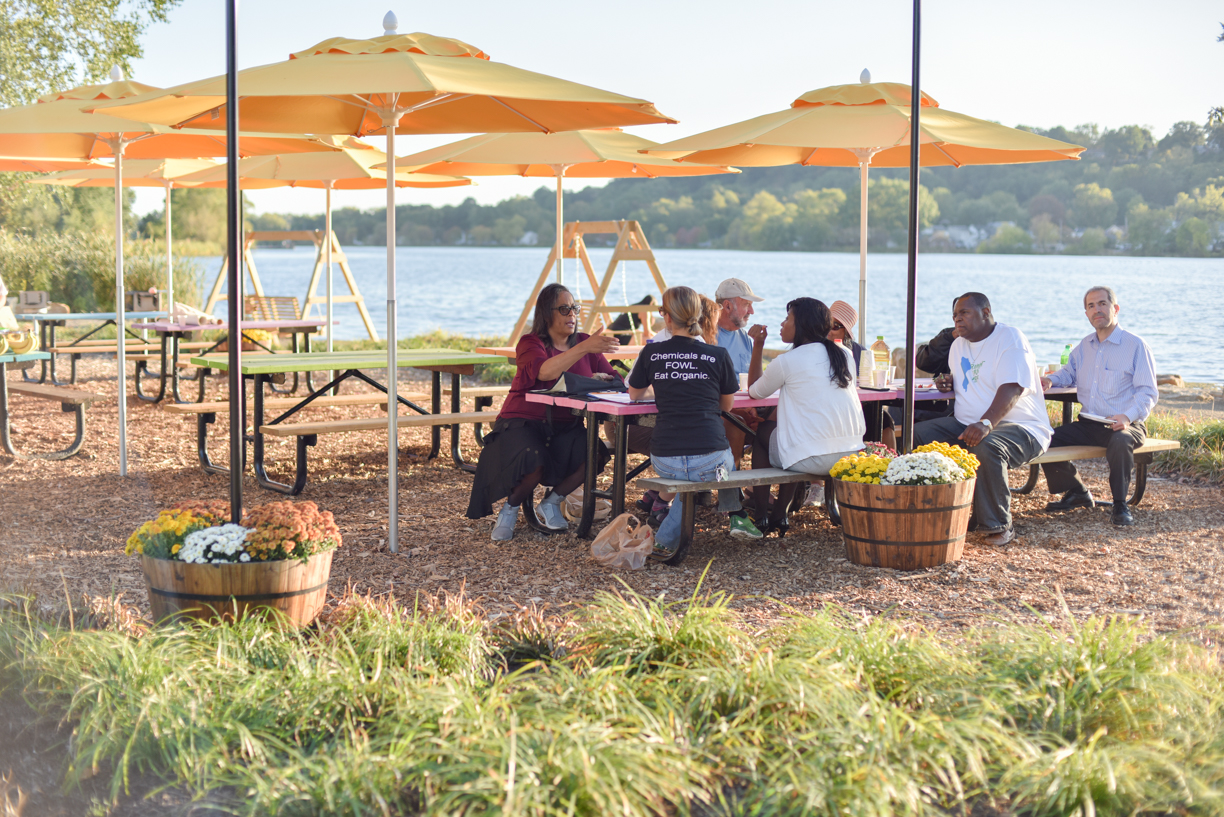
A Polarized Country Still Needs to Eat
Lilly Weinberg is director for community foundations at Knight Foundation. Below, she highlights a recent report detailing the impact of the Knight-supported On the Table initiative, which brings together community residents over mealtime conversations to discuss pressing community issues.
In a time of growing polarization, when trust in institutions of all kinds has hit all-time lows and social media conversations often descend into hateful rhetoric, it may seem difficult to find pathways for consensus and common ground. At the same time, the strength of our democracy and our local communities relies on connected action — the ability of residents to hear each other, make informed choices and shape decision-making.
Through this lens, in 2017 Knight Foundation expanded an initiative of the Chicago Community Trust called On the Table. Founded on the basic premise that ‘we all need to eat,’ On the Table brings people from different backgrounds and income levels together to share a meal and discuss pressing community issues. In a few short years, with the help of community foundations across the country, it has united tens of thousands of city residents on a single day to talk about issues from affordable housing and climate change to racial equity and transportation.
At Knight Foundation, we’ve witnessed the impact of On the Table first-hand. We’ve seen how these conversations have informed decisionmakers and led to greater community attachment and connection. In 2017, we convened more than 40,000 people in 10 cities across the country; conversations took place in large and mid-size metropolitan communities and rural areas from the South to the Midwest to the Pacific Coast.
This year, we’ve seen the momentum grow, with participant numbers across 10 cities up to 50,000, and more to tally. Community foundation partners are fueling this energy, offering micro-grants to implement ideas discovered through On the Table in cities such as Philadelphia and Charlotte, N.C., and helping participants raise awareness for issues important to them. In Lexington and Macon the conversations and data informed their five-year strategic plans. Democracy at its best!
What’s most extraordinary however is that amidst growing community narratives of division and dissent — people still want to convene. On the Table reveals, in fact, that city residents are hungry for connection. They want to help make their neighborhoods better and take action in their shared community. And despite the growing role that technology is playing in our lives, there’s a deep desire for in-person, solution-building between people who would otherwise never meet.
This grasp of the ‘power of local’ is important. At the end of the day, your vote for president is secondary if your local school system is broken or your lake polluted. Local communities are where people have the ability to affect change and see its immediate results. And On the Table is giving them a forum to do just that.
In an effort to measure the initiative’s impact, we conducted real time surveys with participants with the help of the University of Illinois at Chicago’s Institute for Policy and Civic Engagement. Here are four important takeaways from the findings:
- Most participants gained new understanding of how to address issues facing their community. The majority of people (58%) said they gained a somewhat-to-much better understanding of how to address issues in their community.

- On the Table spurred new connections with neighbors and encourage civic action. Many respondents reported making new connections with other respondents, including speaking with someone new (62%). Nearly 9 in 10 respondents (86%) said they are somewhat-to-very likely to take action after On the Table, with 40% saying they are very likely.

- Knowledge is power. Learning about new ways to address community issues encouraged civic action, among both those who are very involved in their community (87 percent) and those who aren’t (72 percent).

- Local context matters. Equity and social inclusion, economic issues and poverty, and education and youth development were among the top issues discussed during the On the Table conversations. But topics varied depending on the city. Housing and homelessness, for example, played a large part in discussions in Silicon Valley and Long Beach.
The results are a powerful reminder that despite daily reports of political conflict and ideological collides, people are hopeful—they want to find a way forward. By combining the common need to eat with a platform for positive local change, On the Table provides an outlet for that movement.
To learn more about the On the Table Initiative and the impact of the initiative, click here.
-
Community Impact / Report
Recent Content
-
Community Impactarticle ·
-
Community Impactarticle ·
-
Community Impactarticle ·



